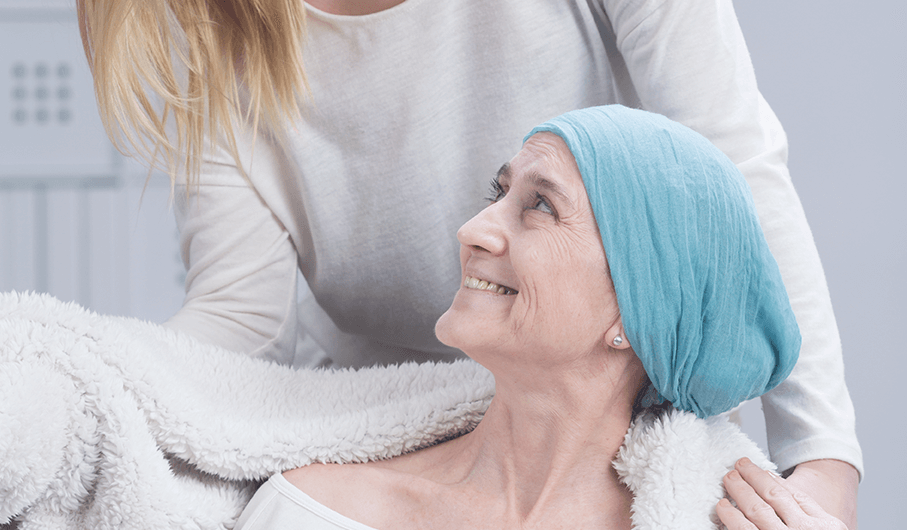Complications and side effects of cancer and cancer treatment
Cancer and cancer treatment can cause several complications. Although we list many possible complications and side effects below, remember that many factors influence which side effects you may get, including your type of cancer, the type of treatment you receive and your general health status. Your treating doctor will know best how to manage any side effects you may experience, some of which may be:
- Brain and nervous system problems: Cancer can press on nearby nerves and cause pain and loss of function of one part of your body. Cancer that involves the brain can cause headaches and stroke-like signs and symptoms, such as weakness on one side of your body.
- Breathing difficulty: Cancer and cancer treatment may cause a feeling of being short of breath. Your doctor can prescribe treatments that may bring relief.
- Changes in mood or thinking like anxiety, emotional distress, depression and chemo brain (a common term used by cancer survivors to describe thinking and memory problems that can occur after cancer treatment).
- Chemical changes in your body: Cancer can upset the normal chemical balance in your body and increase your risk of serious complications. Signs and symptoms of chemical imbalances might include excessive thirst, frequent urination, constipation and confusion.
- Constipation: certain medical conditions – and medicine (like pain medicine) – can cause constipation.
- Dehydration, as a result of inadequate fluid intake and related side effects, like vomiting.
- Diarrhoea: Some chemotherapy medicine may irritate the lining of your digestive system resulting in diarrhoea – usually in the first few days after each treatment. Other medicine and radiation therapies that focus on your abdomen, pelvis or lower back can also cause diarrhoea.
- Eating problems like poor appetite, swallowing problems and mouth problems.
- Falling: Cancer patients who are unsteady on their feet, a little confused or just weak are at risk of falling.
- Fatigue being extremely tired) has many causes, but it can often be managed. Fatigue associated with chemotherapy or radiation therapy treatments is common, but is usually temporary.
- Fertility and sexual side effects: Cancer treatments can impact fertility and sexual health and should be discussed with your doctor.
- Fever that can be due to medicine reactions, inflammatory illness or tumour growth.
- Hair loss: Some cancer treatments make people lose some or all of their hair, most often in clumps during shampooing or brushing.
- Infections can affect people who have cancer or are getting cancer treatment and should be carefully monitored with your doctor.
- Leg cramps due to staying in bed for long periods, dehydration, medicine, brain or nerve diseases and blood chemistry imbalances.
- Low blood counts: Low red blood cells (called anaemia which causes tiredness and fatigue), white blood cells (called neutropenia which increases the risk of infection) or a low platelet count (causing bruising).
- Lymphedema resulting in swelling in a part of the body.
- Mouth problems like dry mouth, mouth sores, bleeding in the mouth and eating problems. Cancer-related mouth sores may form on the inner lining of your mouth or on your lips and can be painful, making it difficult to eat, talk, swallow and breathe.
- Nausea and vomiting: Your doctor can sometimes predict if your treatment is likely to cause nausea and can assist you to manage this.
- Ostomies: An ostomy (or stoma) is a surgically created opening for waste to leave the body. A stoma bag is fitted around the new opening to collect the waste. An ostomy allows waste to leave the body from the intestines (ileostomy or colostomy) or from the bladder (urostomy).
- Pain: Not all cancer is painful. Medicine and other approaches can effectively treat cancer-related pain.
- Peripheral neuropathy: A set of symptoms caused by damage to nerves that control the sensations and movements of our arms and legs.
- Seizures can be caused by high fevers, serious infections of the fluid around the spine and brain, an imbalance in body chemistry or tumour growth in the spine or brain.
- Shortness of breath: A number of different problems can cause this but it may also be caused by pain, immobility, poor nutrition, stress or anxiety, allergic reactions, anaemia, side effects of cancer treatment (such as surgery, chemotherapy or radiation) or a tumour.
- Skin problems like dry skin, itchy skin and changes in skin colour.
- Sleep problems: Reasons for changes in usual sleeping habits include pain, anxiety, worry, depression, night sweats or the side effects of treatment or medicine.
- Sweating usually due to fever.
- Swelling caused by retaining salt and water due to medicine, poor nutrition, pelvic tumours, blockage in the veins or lymph system, or heart, liver or kidney failure.
- Unusual immune system reactions to cancer: In rare cases the body's immune system may react to the presence of cancer by attacking healthy cells, called paraneoplastic syndrome. It can lead to a variety of signs and symptoms, such as difficulty walking and seizures.
- Weakness due to treatment side effects, poor or no appetite, constipation, skin sores, problems with breathing, painful or stiff joints, worsening fatigue and mental changes.
- Weight loss: Cancer may deprive normal cells of nutrients. This is often not affected by how many calories or what kind of food you eat. Weight loss during cancer can be complicated to treat.

Tools to monitor your treatment
Here are some downloadable documents to help you keep track of your side effects, pain and medicine.
References
